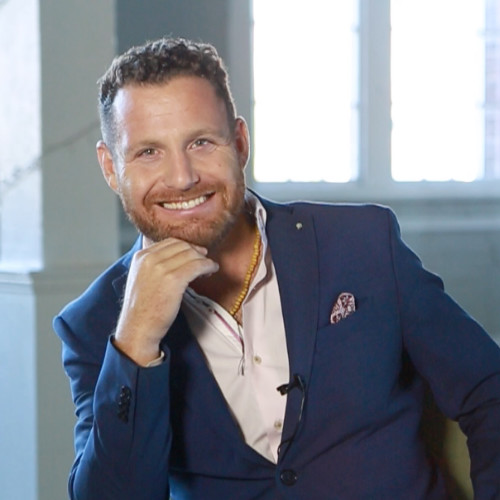Everyone talks about the glory of entrepreneurship. The freedom, the control, the potential for unlimited income. What they don't tell you about is the 3 AM panic attacks, the constant financial stress, and the crushing isolation of making decisions that affect your entire livelihood.
We recently had Rob Matzkin on Six-Figure Secrets of Fractional Experts, a serial entrepreneur who's started 16 companies, had two exits, and now runs a successful fractional business while investing through his VC fund. Rob shared the brutal realities of entrepreneurial life that most people won't admit – and more importantly, how to navigate them without losing your sanity.
The Rollercoaster No One Warns You About
"It's a friggin' rollercoaster," Rob says. "And anybody who says it's not is lying."
Here's what that actually looks like: You're raising money from friends and family, so you have to appear successful to everyone around you. Your customers need to think you're thriving. Even your spouse has to believe everything's going perfectly. You literally have nobody to talk to about the real struggles.
Rob describes the mental whiplash perfectly: "I would go from 'I'm worth $100 million' to 'I'm worth nothing, I need to sleep on a friend's couch' to 'I'm worth $200 million' to 'I'm gonna be homeless.' Like, where am I gonna eat tonight?"
This isn't just startup life. Even as a successful fractional executive, Rob experiences this cycle: "I went from sitting pretty to, okay, this month I need to hustle, let's get a few more clients, let's make up for this."
Why Traditional Advice Doesn't Work
The problem with most entrepreneurship advice is that it treats the emotional reality as a bug, not a feature. You're told to "stay positive" or "focus on the vision." But the truth is, these extreme highs and lows are inherent to the game.
Rob's breakthrough came from reading "The Hard Things About Hard Things" by Ben Horowitz at 28. "This book blew my mind because I realized I'm not alone. Everybody goes through this."
The key insight? Stop trying to eliminate the rollercoaster. Learn to ride it better.
The Three Systems That Keep You Sane
Rob has developed three core systems for managing the inevitable chaos of entrepreneurial life:
1. Hack Your Productivity with Extreme Structure
"The more structure you have, the more freedom you have," Rob explains. His approach is almost military in its precision: he plans every 10-15 minutes of his day like it's the most important meeting he'll ever have.
"I write down from 7 a.m. to whenever I'm leaving my desk – what am I doing? When am I going to the bathroom? What am I eating?" This might sound excessive, but it serves a crucial purpose: when your mind is spinning with anxiety, having a detailed plan removes decision fatigue and keeps you moving forward.
2. Get Out of Your Head and Into Your Body
"I'm a huge kite surfer these days. I used to be a surfer, I used to be an acrobat. I've always done some sort of hobby to get myself out of my damn head and into my body and just let the world disappear at least a few times a week."
This isn't about "work-life balance." It's about mental survival. When you're constantly making high-stakes decisions, you need activities that force you into the present moment and out of the anxiety spiral.
3. Master Deep Work in Small Chunks
Rob swears by Cal Newport's "Deep Work" philosophy: "If you could chunk the biggest project you have and block off an hour to hour and a half of uninterrupted time to get that done, it'll be the biggest favor you could do to yourself."
But here's the crucial addition: plan this the night before. Rob and I discovered we have opposite rhythms here – he's a morning planner, I'm a night-before planner – but the key is having clarity before you start your day.
The Business Reality Check
Let's address the elephant in the room: as fractional executives, we're all essentially in the same business, regardless of our specialty.
"What business are you really in?" Rob asks. "You're in client acquisition. Delivering the product – if delivering the product was hard, we wouldn't be doing what we're doing right now. It's probably our natural spot."
This is the harsh truth most consultants avoid. We love talking about our expertise, our methodologies, our unique approach. But none of that matters if you can't consistently acquire clients.
The Data vs. Emotion Trap
One of Rob's most valuable insights comes from his startup experience: "The companies that live or die – the ones who fail are the ones who go 'I think this, I'm just going to go do it' without any feedback loop. The ones that succeed are the ones who say 'let's run a test. What does the data show us?'"
This applies directly to fractional businesses. When you're in feast-or-famine mode, it's easy to make emotional decisions. But successful fractionals separate emotion from data:
- Are you getting second meetings?
- Are your proposals being accepted?
- Where in the sales process are you losing prospects?
- What's your actual close rate?
The data tells you what to fix. The emotion just tells you to panic.
The Vulnerability Advantage
Here's something most business advice gets wrong: people don't want to work with perfect consultants. They want to work with real humans they can trust.
Rob shared something powerful: "For the longest time, being dyslexic and not reading until I was 10 years old was super embarrassing. I thought I was stupid. But sharing that vulnerability – that's what builds real connections."
This doesn't mean oversharing or making clients your therapists. It means being authentically human in your interactions. People buy from people they know, like, and trust. Vulnerability accelerates all three.
The Networking Game Nobody Talks About
Rob's most effective marketing strategy isn't Facebook ads or LinkedIn content. It's strategic networking. But here's the twist: he's an introvert who grew up shy.
"Being out there is a net energy loss for me," he admits. "But I'm intentional about it."
His secret? Don't network with your target audience. Network with people who can refer you to your target audience. "If I'm in a room with startup founders, I'm hurting. But if I'm in a room with other people who could refer me to those founders as trusted partners, that room is something special."
The Productization Reality
Everyone talks about "productizing your services" for scalable revenue. Rob recently went through this exercise, starting with 80 different things he does for clients.
"I couldn't have an 80-week program," he laughs. The key was distilling everything down to four core pillars that represent the real difference he makes for clients.
But here's what's often missed: productizing isn't just about creating packages. It's about clarifying your own thinking about what you actually do and why it matters.
The Truth About "Making It"
The hardest truth Rob shared? The rollercoaster doesn't stop when you "make it." Success brings new challenges, new pressures, new anxieties.
"Unless you get to an overwhelming point of lead generation and really get over a certain inflection point, it's the nature of business. You're always going to be stretching yourself and not resting on your laurels."
This isn't meant to discourage you. It's meant to prepare you. The goal isn't to eliminate the challenges – it's to build systems and mindsets that help you navigate them more effectively.
Your Next Move
Rob leaves us with two powerful reminders:
"The more structure you have, the more freedom you have."
"The darkest part of the night is right before dawn."
If you're struggling right now, if feast-or-famine is wearing you down, if the isolation feels crushing – you're not alone. Every successful entrepreneur has been exactly where you are.
The question isn't whether you'll face challenges. The question is whether you'll build the systems, mindsets, and support structures to navigate them successfully.
Build your structure. Get out of your head. Separate emotion from data. Be authentically human in your interactions. And remember: you might be closer to your breakthrough than you think.
Mylance
This value-added article was written by Mylance. Mylance takes your marketing completely off your hands. We build the marketing machine that your Fractional Business needs, but you don't have time to run. So it operates daily, growing your brand, completely done for you.Instead of dangling numbers in front of you, our approach focuses on precise and thoughtful input: targeted outreach to the right decision makers, compelling messaging that resonates, and content creation that establishes trust and legitimacy.To apply for access, submit an application and we'll evaluate your fit for the service. If you’re not ready for lead generation, we also have a free, vetted community for top fractional talent that includes workshops, a rates database, networking, and a lot of free resources to support your fractional business.

Written by:
From Uber to Fractional COO to Mylance founder, I've run my own $25k / mo consulting business, and now put my business development strategy into a service that takes it all off your plate, and powers your business





